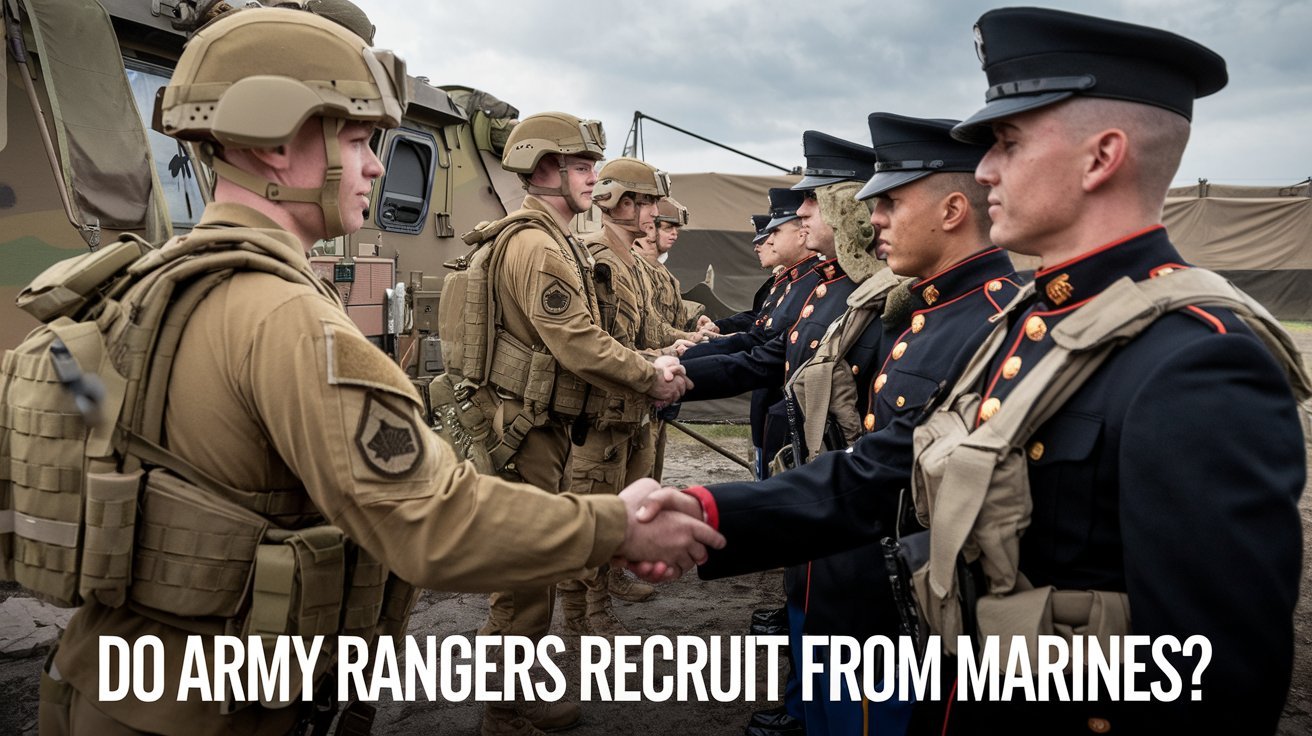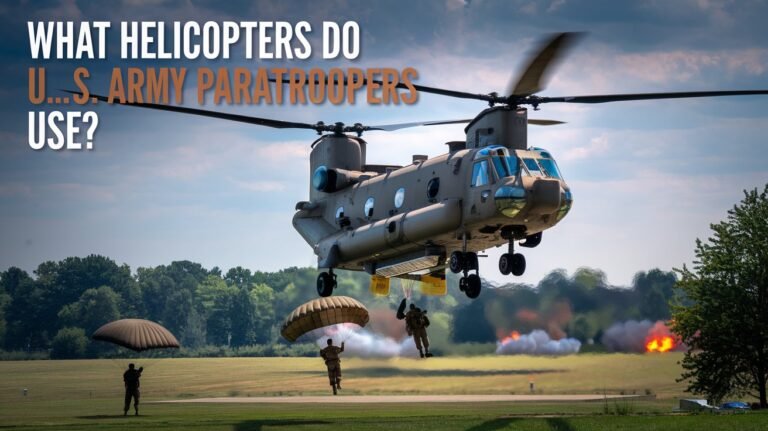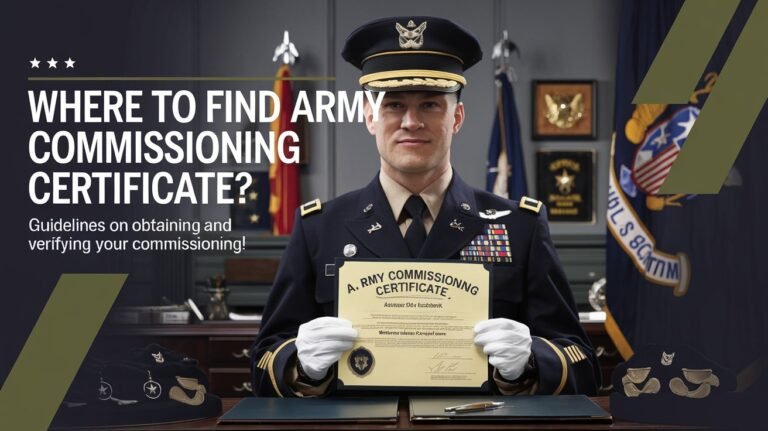Do Army Rangers Recruit From Marines? Eligibility Details

The Army Rangers and the US Marines have a special bond. Despite their different missions and training, Rangers often look to recruit Marines. This move allows Marines to join the Rangers, bringing their battle-tested skills and leadership to the team.
Joining the Army Rangers from the Marines is tough. But for those who pass, it’s a chance to make a big impact. The selection process is intense, testing both physical and mental strength. It’s designed to find the best and most dedicated, who then earn the Ranger tab.
Do Army Rangers Recruit From Marines: Direct Transfer Process
The Army Rangers are known for their elite status in special operations. They often recruit experienced Marines. This process lets Marines use their skills and combat experience to join the Ranger Regiment.
Basic Training Requirements for Marine Transfers
Marines wanting to join the Army Rangers must meet certain basic training requirements. These include:
- Successful completion of Marine Corps Boot Camp and Marine Combat Training
- Minimum of 12 months of active-duty service in the Marine Corps
- Attainment of the rank of E-4 (Corporal) or above
These requirements make sure Marine applicants have the right foundation and leadership skills. They are ready for the tough Ranger training.
Documentation and Application Steps
The direct transfer process for Marines involves detailed documentation and a thorough application. Candidates must submit a package with:
- Letter of recommendation from their current commanding officer
- Detailed military service record (DD-214 form)
- Copy of their current security clearance
- Completed Ranger Assessment and Selection Program (RASP) application
This detailed documentation helps the Army Rangers evaluate each Marine applicant’s qualifications and suitability.
Medical and Physical Screening Protocol
Marine transfers to the Army Rangers also face a rigorous medical and physical screening. This includes:
- Comprehensive medical examination to assess overall health and fitness
- Physical fitness assessment to evaluate strength, endurance, and agility
- Psychological evaluation to ensure mental readiness for the Ranger lifestyle
This screening ensures Marine candidates meet the high standards of the Ranger Regiment.
Physical Fitness Standards for Marine-to-Ranger Transitions
Switching from the Marine Corps to the Army Rangers is tough. You need to meet high physical fitness standards. Marine Corps tests are a good start, but Army Rangers have even higher expectations.
The Ranger Physical Fitness Test (RPFT) is a big challenge. It tests your strength, endurance, and agility. This test is harder than the Marine Corps Physical Fitness Test (PFT). It looks at things like:
- Two-mile run (must complete in under 15 minutes)
- Pull-ups (minimum of six)
- Push-ups (minimum of 49 in two minutes)
- Sit-ups (minimum of 59 in two minutes)
- Ranger push-ups (minimum of 33 in one minute)
Army Rangers also need to show they can do more than just pass the RPFT. They must be good at land navigation, obstacle courses, and carrying heavy packs over long distances. These skills help Rangers handle tough terrains and missions.
| Fitness Test | Marine Corps PFT | Ranger Physical Fitness Test |
|---|---|---|
| Run | 3-mile run | 2-mile run (under 15 minutes) |
| Pull-ups | Minimum of 3 | Minimum of 6 |
| Push-ups | Minimum of 44 in 2 minutes | Minimum of 49 in 2 minutes |
| Sit-ups | Minimum of 50 in 2 minutes | Minimum of 59 in 2 minutes |
| Ranger Push-ups | Not required | Minimum of 33 in 1 minute |
Meeting these tough standards is key for Marines wanting to join the Army Rangers. It shows they have the fitness and toughness needed to succeed in this elite unit.
Combat Experience Value in Ranger Selection
Marines looking to join the army rangers find their combat experience very valuable. The U.S. Army’s elite Ranger regiment looks for marines. They know the skills and tactics marines bring are key to their success.
Marine Combat Skills That Transfer
Marines are known for their skills in tough, high-stress situations. Their training in close combat, marksmanship, and small-unit tactics fits well with ranger operations. Their experience in complex maneuvers, like amphibious landings, is also valuable.
Adapting Marine Tactics to Ranger Operations
Marines and rangers have different roles, but marines can easily adapt their tactics. They learn about ranger equipment, communication, and planning. This ensures a smooth transition into the ranger team.
Special Operations Background Benefits
- Marines often have experience in roles like reconnaissance, sniper, or special operations. These are highly valued in ranger selection.
- The ranger regiment looks for candidates with experience in complex, high-intensity environments. Marine veterans are a great fit.
- The mental toughness, discipline, and leadership skills marines develop are also important. Rangers want individuals who can handle their demanding training and operations.
Training marines as army rangers is a win-win. It combines the marine’s combat experience and skills with the ranger’s elite force. This partnership boosts the capabilities of both organizations.
Time Requirements and Service Commitments
Switching from the Marines to an Army Ranger has its own time and service rules. The marine to army ranger pipeline and marines becoming army rangers journey is detailed. Knowing the key points can make the transition smoother and more successful.
One key thing is the contract length. Marines joining the Army Rangers usually sign a 3-year contract. They might extend it based on several factors. This shows the Ranger role’s unique training and high standards.
- Training Period: The first training for Marine-to-Ranger transfers lasts several months. It includes basic training updates and Ranger-specific tests.
- Additional Obligations: Sometimes, Marines have to serve in the Army Reserves or National Guard. This is to meet the total contract length.
Marines thinking about the marine to army ranger pipeline should look at the time and service needs carefully. Knowing these details helps plan a smooth move to the Army Rangers.
| Requirement | Details |
|---|---|
| Contract Length | Minimum 3-year contract, with potential for extension |
| Training Period | Several months of refresher training and Ranger assessments |
| Additional Obligations | Potential service in Army Reserves or National Guard |
“The time and service commitments involved in transitioning from the Marines to Army Rangers are not to be taken lightly. It’s a significant undertaking that requires careful planning and a deep understanding of the process.”
Ranger Assessment and Selection Program for Marines
Marines thinking about joining the Army Rangers face a big challenge. They must go through the Ranger Assessment and Selection Program (RASP). This tough test checks if they can handle the mental and physical demands of being a Ranger.
Mental Evaluation Components
The RASP starts with a mental test. It looks at how well a candidate thinks, handles stress, and solves problems. These skills are key for success in the Ranger world.
Leadership Assessment Criteria
Candidates need to show they can lead. The RASP checks if they can motivate others, make decisions, and handle tough situations. These skills are vital for leading Ranger teams.
Team Integration Challenges
- Adapting to a new unit culture and dynamics
- Bridging the gaps between Army and Marine Corps training and practices
- Earning the trust and respect of Ranger teammates
- Maintaining a positive attitude and staying resilient during the selection process
Going from the Marine Corps to the Army Rangers is not easy. Marines must be ready to work well with their new team. They need to fit in with the Ranger’s way of doing things.
Special Operations Training Differences
Transitioning from the Marines to the Army Rangers involves understanding special operations training differences. The training methods, focus areas, and operational philosophies vary between these elite units. It’s crucial for Marines to grasp these differences.
Ranger training focuses on small-unit tactics and independent operations in tough environments. Rangers learn specialized skills like reconnaissance, direct action, and unconventional warfare. Their training includes field exercises, live-fire drills, and simulations that test their physical, mental, and tactical skills.
Marine special operations training, on the other hand, emphasizes amphibious operations, urban warfare, and combined arms maneuvers. While Marines also get rigorous training in special operations, the approach might differ from the Army Rangers’ program.
“The training for Army Rangers and Marine special operations forces may have some overlap, but there are distinct differences in the way they prepare their operators for the challenges of modern warfare,” explains Captain Emily Wilkins, a former Marine who successfully transitioned to the Army Rangers.
Understanding these training differences and adapting to the Ranger’s unique operational philosophy is a big challenge for Marines. Yet, with the right mindset and dedication, many Marines have successfully transitioned and thrived in the Ranger environment.
Security Clearance and Background Checks
Marines wanting to join the Army Rangers must go through a security clearance and background check. The army rangers accepting marines from other branches have strict rules. These rules help keep the special unit safe and trustworthy.
Prior Service Investigation Requirements
Marines moving to the Army Rangers face a detailed investigation. Their military history, any disciplinary actions, and their trustworthiness are reviewed. The military branch transfers to army rangers need extra checks to make sure they’re ready for the Ranger program.
Maintaining Clearance Standards
- Army Rangers must keep their security clearances high, often at Top Secret.
- They need regular checks and must follow strict rules on personal conduct and finances.
- Any changes in their background or behavior could risk their clearance and Ranger status.
Marines transitioning must be ready to meet these tough security standards. This is key to joining the Army Rangers’ elite ranks.
Career Advancement Opportunities After Transfer
Marines moving to the Army Rangers find a path to new career heights. Their combat experience makes them valuable in the Army’s special operations. This is a big step up for them.
One key advantage is the chance to lead. Marines often get promoted quickly to NCO or officer roles. They use their skills to guide and lead younger soldiers.
- Increased chances of promotion to leadership roles such as squad leader, platoon sergeant, or even company/battalion executive officer
- Opportunity to attend specialized training like Ranger School or Airborne School, further enhancing their skills and qualifications
- Long-term career trajectories within the Ranger Regiment or broader Army Special Operations Command (SOCOM)
| Career Advancement Opportunities | Benefits for Marines Transitioning to Army Rangers |
|---|---|
| Leadership Roles | Experienced marines often fast-tracked into NCO and officer positions |
| Specialized Training | Chance to attend elite schools like Ranger School or Airborne School |
| Long-Term Careers | Potential for lifelong service within Ranger Regiment or SOCOM |
Marines joining the Army Rangers have many career opportunities. They can use their combat skills to excel in the Ranger Regiment. This could lead to a long and successful career in special operations.
Common Challenges Marines Face in Ranger School
Marines thinking about joining the army rangers face big challenges. Moving from the marine corps to the army’s elite ranger program is tough. They must learn new ways, tactics, and a different culture.
One big challenge is getting used to the army’s training style. Ranger school focuses on small team tactics, navigation, and leading in tough situations. This is different from the marine corps’ focus on big battles. Marines need to change their ways and learn the army’s special operations style.
- Mastering army-specific land navigation techniques
- Adapting to the ranger regiment’s focus on stealth and precision
- Developing the ability to thrive in sleep-deprived, high-stress environments
Marines also face mental challenges when switching military branches. The bond and team spirit in the marine corps is hard to match. Rangers need to quickly fit into a new team.
“The transition from marine to ranger is not just physical, but also mental. You have to be willing to leave behind your marine identity and fully embrace the ranger way of life.”
To overcome these challenges, marines need mental strength, flexibility, and a true commitment to the ranger mission. Those who succeed become key members of the army’s special operations team.
Unit Culture Adaptation and Integration
Switching from the Marine Corps to the Army Rangers is not just about passing tough training. Marines must also get used to the unique culture and leadership in Ranger battalions. Even though both branches value being warriors, their daily work, decision-making, and team interactions can be quite different.
Marines joining the army special operations will have to change how they communicate, solve problems, and lead. Ranger units have a flatter structure, make decisions quickly, and work more independently than Marine units. Getting used to these differences is key for fitting in and keeping the unit strong.
Marines who make the switch to Rangers will use their combat skills and tactical knowledge. They also need to be open to learning the Ranger way. This flexibility, along with a desire to be part of the Ranger legacy, will make them valuable team members. They will continue to perform well in the toughest special operations tasks.
FAQ
Do Army Rangers Recruit From Marines?
Yes, the Army Rangers recruit from the Marine Corps. They value the skills and experience Marines bring. Marines who meet the requirements can join the Rangers and contribute their expertise.
What Are the Basic Training Requirements for Marine Transfers to the Army Rangers?
Marines transferring to the Army Rangers must pass the Ranger Assessment and Selection Program (RASP). They need to show they can handle land navigation, small unit tactics, and physical fitness. These skills must meet the Ranger’s high standards.
What is the Documentation and Application Process for Marines Joining the Army Rangers?
Marines joining the Army Rangers need to submit forms and documents. This includes a request for transfer, medical records, and security clearance. After review, they must pass medical and physical screenings to be selected for training.
What Are the Physical Fitness Standards for Marine-to-Ranger Transitions?
Marines must meet high physical fitness standards to join the Army Rangers. They need to excel in the Ranger Fitness Assessment. This test checks strength, endurance, and readiness for Ranger operations.
How Does Marine Combat Experience Benefit the Ranger Selection Process?
The Army Rangers value Marines’ combat experience. They see Marines’ skills in small unit tactics and special operations as assets. The Rangers look for Marines who have proven themselves in combat.
What Are the Time Requirements and Service Commitments for Marines Joining the Army Rangers?
Marines joining the Army Rangers must commit to long service contracts and training. They need to complete the Ranger Assessment and Selection Program and additional training. This requires a significant time investment and service commitment.
How Does the Ranger Assessment and Selection Program (RASP) Evaluate Marines?
The RASP evaluates Marines’ mental, physical, and leadership abilities. It tests decision-making, stress management, and team integration. Marines must show they can excel in the Ranger environment.
What Are the Key Differences in Special Operations Training Between Marines and Army Rangers?
Marines and Army Rangers have different special operations training. There are differences in training methods, focus areas, and operational philosophies. Marines must adapt to the Ranger’s unique training and tactics.
What Security Clearance and Background Check Requirements Apply to Marines Joining the Army Rangers?
Marines joining the Army Rangers face rigorous security clearance and background checks. They undergo additional scrutiny due to their military service. They must maintain the necessary clearance levels and standards.
What Career Advancement Opportunities Exist for Marines After Transferring to the Army Rangers?
Marines who join the Army Rangers have many career opportunities. They can take on leadership roles, access specialized training, and pursue long-term careers in Army Special Operations.
What Common Challenges Do Marines Face When Attending Ranger School?
Marines at Ranger School face challenges like adjusting to Army protocols and tactics. They also deal with psychological hurdles from changing military branches. Adapting to Ranger School’s demands is a big challenge.
How Do Marines Integrate Into the Army Ranger Unit Culture?
Integrating into the Army Rangers’ culture is a challenge for Marines. They must adapt to different leadership styles, tactics, and organizational dynamics. Marines need to be adaptable, willing to learn, and maintain unit cohesion.






